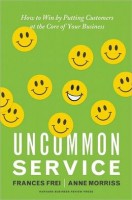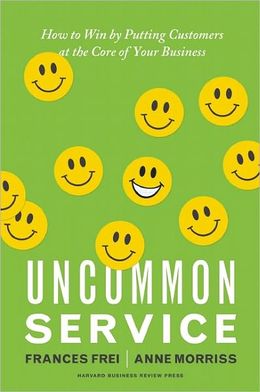 Authors: Frances Frei and Anne Morriss
Authors: Frances Frei and Anne Morriss
Publisher: Harvard Business Review Press – 247 pages
Book Review by: Sonu Chandiram
In today’s competitive business environment, with few exceptions, it is almost impossible to avail continuous supply of a product on an exclusive basis, so that a company can dictate its price to customers and get the lion’s share of a business. Even manufacturers cannot control retail prices of their products due to competition from importers or other domestic makers of similar goods.
One of the key differentiators is the level of customer service. In most U.S. companies, especially consumer-oriented ones or B-to-C firms, bad or uncaring service is the norm. Good customer service is uncommon. That is essentially what this book is about. With the United States deriving 80 percent of its gross domestic product from services rather than goods, and four of every five jobs being in the service sector, customer service is all the more important for the employer and the employee as well.
Two experts in the study of customer service assert that designing a good service model is the key to making customers happy and satisfied, and retaining them for good so they became a predictable revenue source. Keeping sales (and profits) steadily growing is one way to keep a company financially healthy. And when many more customers are made happy this month (or this year) compared to last month (or last year) for example, predictable revenue increases and the company grows.
That is the main message I got from this book. You and I have heard and read many similar messages on the primary importance of customers. Many business writers have emphasized the importance of providing “service with a smile” as a key to success in business.
John Tscholl for example has written several business books that focus on providing outstanding customer service. Some of them for example are: Achieving Excellence Through Customer Service (1991), Feelings: Quality Service First Time, Every Time (1992), Cashing in: Make More Money, Get a Promotion, Love Your Job (1995), e-Service: Speed, Technology and Price Built Around Service and The Customer is Boss (2001), Connections: Practice Excellence: Path for Success (2003), Loyal for Life (2005) and Empowerment: A Way of Life (2010). Some of these works are with other authors.
Designing a unique customer service model that serves customers effortlessly is of primary importance in the success of a business, the authors point out, but there are four important points you need to be aware of within your serve-thy-customers mantra, to grow your business. The duo calls them their simple truths which they share with you in this book decorated with smileys:
- You Can’t Be Good at Everything
- Someone Has to Pay for It
- It’s Not Your Employees’ Fault
- You Must Manage Your Customers
Once your employees or fellow workers have learned and practiced these truths, it is important that they become part of their very being, the authors point out in some many words.
This can be done when these truths are practiced top down from the CEO to the lowest-level worker. When they are ingrained and become part of the company culture, success happens, and success simply grows. The authors have a simple formula : Service Excellence = Design x Culture.
They point out three well-known firms that have attained and practice a company culture devoted to serving and helping customers and making them happy and satisfied:
- Commerce Bank
- Southwest Airlines
- Zappos
Once your company “has mastered the service excellence equation” and you now have a good team imbued with the values of great customer service within a harmonious company culture, and your customers are happy, the next step is growth.
Growth is a good objective for companies that have created a successful service model. One way to reach it is to do more of the good thing. Expanding your markets, your product or service offerings are good options. And the authors suggest building new service models.
This is a good book with practical, common-sense and down-to-earth advice for business owners and managers, and top-level executives to design customer service models that can be easily learned by employees at all levels and nurture it within a conducive, cheerful company culture.
Frances Frei is UPS Foundation professor of service management at Harvard Business School. As Chair of the MBA Required Curriculum, she is also helping to transform the student experience at HBS.
Anne Morriss is the managing director of the Concire Leadership Institute, a consulting firm that helps leaders to identify and overcome performance barriers.







